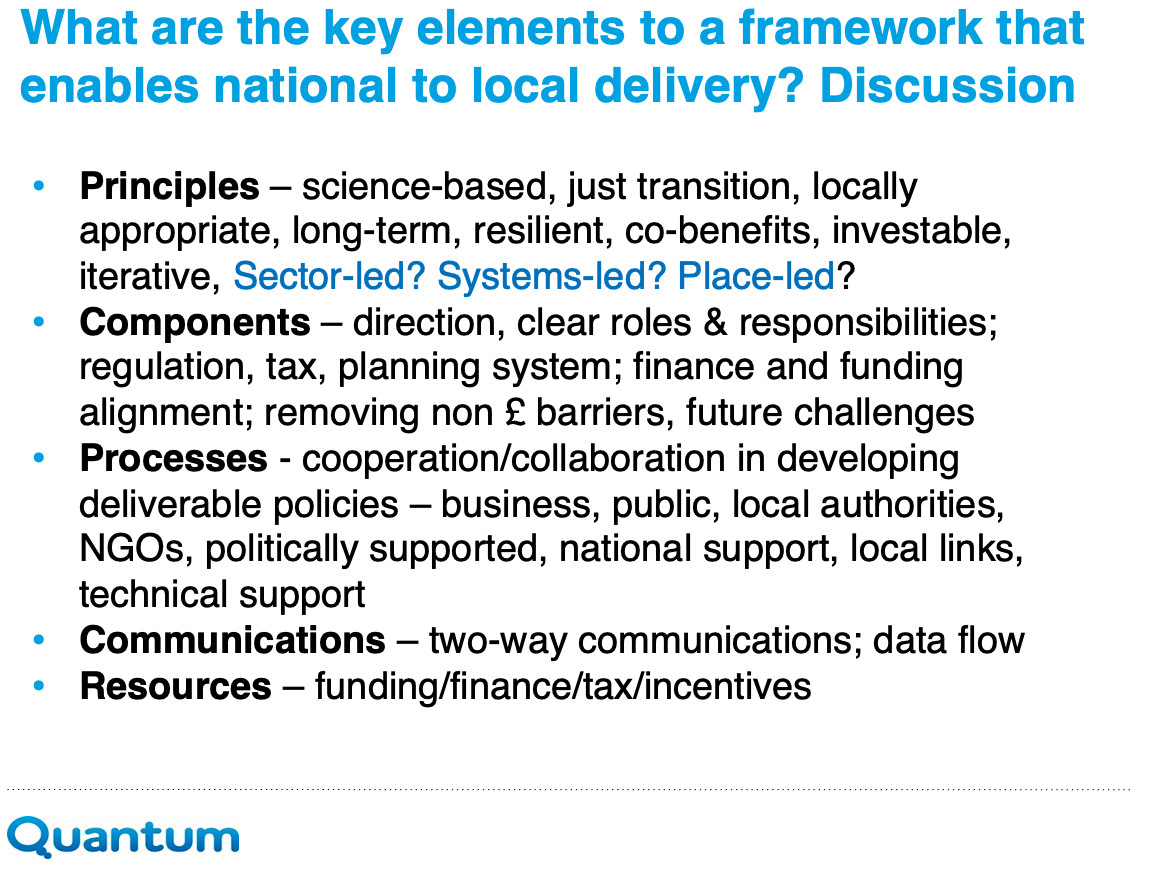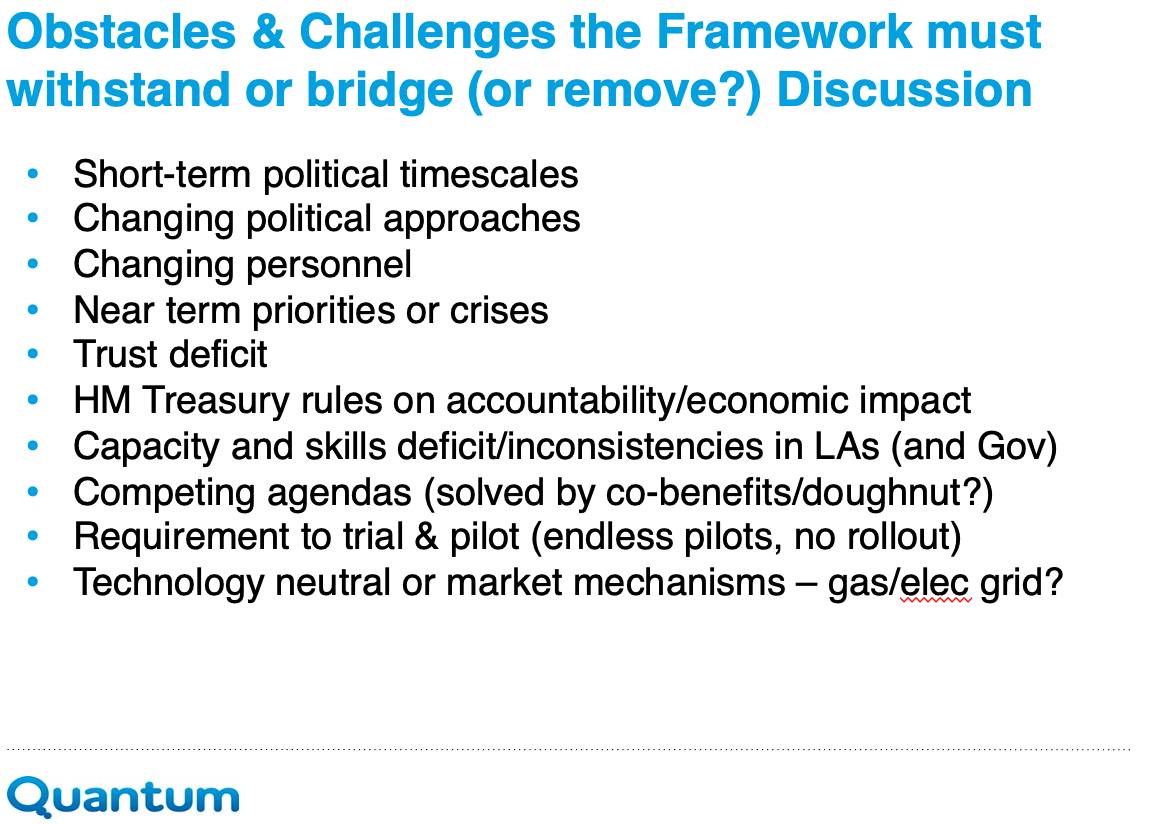Making Net Zero happen – developing a Framework for local Net Zero delivery
This month we have a guest blog from Louise Marix Evans, Director, Quantum Strategy & Technology and formerly Senior Advisor to the Climate Change Committee, author of Local Authorities & the Sixth Carbon Budget.
We can only achieve Net Zero if national government, regional organisations and local authorities work effectively together. That is not happening yet, although we see some rays of hope. So how do we align all these organisations, sectors, projects and budgets? And how do we do that with urgency, whilst still delivering vital services and a green recovery from the pandemic?
If 2019 was the year of Climate Emergency declarations, with over 300 local authorities signing up, 2020 was the year of climate plans and reports centred on local action. 2020 was supposed to start the decade of delivery – it did deliver something – an unexpected pandemic that knocked us sideways. But it also delivered a growing commitment and determination to act on climate change during and in the recovery from the pandemic.
A Net Zero Delivery Framework is something lots of reports published in 2020 have called for. The growing number of Climate Action plans developed by local authorities call for enabling and supportive government policy and resourcing.
But a framework can mean all kinds of things. So what does it need to include?
My CCC report called for Four F’s:
- Framework: An agreed framework for delivery for Net Zero incorporating local and national climate action – this would outline deliver roles and responsibilities across different scales
- Financing: Appropriate long-term financing to support local authorities in delivering Net Zero
- Flexibility: Local operational flexibility around how local areas address climate change
- Facilitation: coherent policy and powers for the facilitation of delivery.
The Local Government Association call for a framework that outlines responsibilities for Government, aligning the regulatory system, the planning system and tax incentives. And that outlines the local responsibilities plus a commitment to cooperate with local public sector bodies. They call for enabling powers and long-term funding to enable councils to translate a national framework into transformative local plans.
ADEPT has led on the Blueprint’s recommendations – that government put place-based action at the heart of Net Zero delivery, in the context of a supportive policy and resourcing framework.
These 2020 reports looked through a local authority lens to build up a picture of what was not working well, and how to solve it.
The National Audit Office’s 2020 report, Achieving Net Zero, looked through the other end of the lens, from within Government departments. It confirmed what we knew - that there is little co-operation or planning for interdependencies between government departments and that Net Zero is not yet a priority cross-cutting issue. It confirmed that government had not set out the role of public bodies outside central departments in achieving Net Zero. In some way that was a relief – we were right in our findings. Powers and policy put in place is piecemeal. Funding and initiatives are short-term and competitive so don’t always deliver the emissions cuts and co-benefits they should. We’ve ended up with a system that makes delivering Net Zero far too hard, when it’s already a colossal task in itself.
Having lain awake at night last year trying to work out how national, regional and local policies, funding and actions join up (they don’t), I’m now starting work on this mythical Framework.
UK100 have commissioned us at Quantum to work on this before a leadership summit in July 2021 and by then we’ll have developed a version of a Framework that can be offered as a solution.
We’ll be taking all the evidence from the wide range of partners across the local authority, NGO and business sectors that was developed last year, and working out what needs to be in the Framework.
Taking a ‘Three Pigs’ approach we’ll build a Straw Framework then test it in a workshop against the huffing and puffing of a big bad wolf. We’ll reinforce and refine it to a Stick Framework and test it again. Then by July we’ll have the Brick version that will hopefully stand up to the winds of politics, personnel changes, policy fashions, unexpected events but that reflects the range of types of place, types of local authorities in their many forms and tiers, and that can be improved, altered and built upon.
What status might the Framework have? And who do we think we are saying we can develop one? I’m not sure, and well, we’ve been working collaboratively on many local authority projects over the years. We are curious and inclusive, so we take on board everyone’s views and ideas. And we contribute our knowledge and time to other projects. We also deliver real projects on the ground, so are based in practical reality. Theory is no use if it does not become practically deliverable.
The bit I want to get underneath is how policy makers actually design policy once they've examined the evidence and how the Treasury develops the funding mechanisms to support it. I am looking forward to getting into that – with the help of the team at UK100 and the project Steering Group as well as through wider engagement and workshops.
I am hoping to work with the Blueprint Coalition, and many others across the sector in the next few months to develop the most robust and practically useful Framework suggestion.
So, do feel free to get in touch, and watch out for our testing workshops so you can huff and puff and test the framework to see if it can withstand everything that will be thrown at it, should Government choose to take up this approach.
If this has fired your enthusiasm, here are some ideas I’m deliberating at the moment – the key elements, and the challenges to overcome: do drop me an email with your feedback: [email protected]


